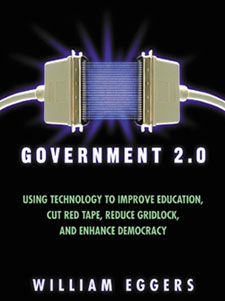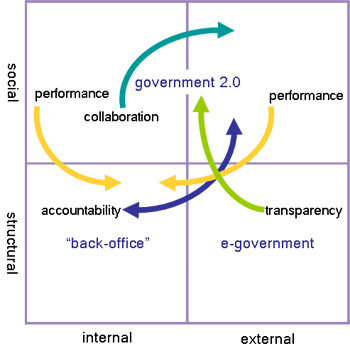June 13, 2010
For at least that past two years, a tiny yet fast-growing group of folks who call themselves “Gov 2.0 advocates” has worked tirelessly to spread a message that emerging technologies, low-cost communications and digital culture can reshape government to be more collaborative, transparent, efficient and connected to its citizens.
We have advocated for humanizing government, and for using new tools to bring more citizens into the deliberative process and to help shape the future of both our democracy and the bureaucracy. One of the main tools for the Gov 2.0 movement has been social media, as activists and line workers join technologists and political reformers in calling for more open communication between officials and agencies and the public they represent and serve.
 Last week, Government 2.0 – a term first used by Bill Eggers in his 2005 e-gov-focused book of the same name, and that has become almost synonymous with Web 2.0 as developers have turned on to the promise of government-brokered data troves and universal open standards – won a significant victory. San Francisco-based Twitter, the popular social media messaging service that has serves as a platform for thousands of startups using its architecture and user base, announced that it is hiring for its first field office, focused on the government sector.
Last week, Government 2.0 – a term first used by Bill Eggers in his 2005 e-gov-focused book of the same name, and that has become almost synonymous with Web 2.0 as developers have turned on to the promise of government-brokered data troves and universal open standards – won a significant victory. San Francisco-based Twitter, the popular social media messaging service that has serves as a platform for thousands of startups using its architecture and user base, announced that it is hiring for its first field office, focused on the government sector.
Twitter Goes to DC
Twitter’s job posting and further remarks by corporate spokesman Sean Garrett explain the DC-based position as the first step towards a public affairs unit, with support for innovative and engaging uses of Twitter in politics and policymaking. A new blog by Garrett and his team has since March been highlighting interesting government uses of the platform, from San Francisco’s integration of Twitter and 311 non-emergency service requests, to construction updates and border crossing wait times by tweet, to the British Prime Minister’s communications usage.
Twitter, thanks to millions of active and aggressive content-sharers and innovators around the world, has transformative powers. Conan O’Brien took to the service to recreate himself after losing his show, creating numerous accounts, rallying his fan base and using the free and frenetic publicity it to launch a comedy tour. Legendary film critic Roger Ebert, after panning Twitter as trite, has become one of its staunchest advocates, using it to deliver and amplify commentary on everything from film to politics to sport and humanism. Newark Mayor Corey Booker has used it to spread a hands-on philosophy of hope far beyond his New Jersey township.
Twitter Grows Due to User Innovations
Twitter’s growth and popular features have often evolved from the minds and whims of its user base, from the intensely popular “retweet” convention for repeating and affirming others’ messages, to the hashtag form of semantic tagging in its short messages, to Follow Friday, the day that tweeps around the world recognize friends and favorites.
Government 2.0 – which first hit Twitter’s mainstream of “trending topics” during a March 16, 2009, pilot broadcast of the Gov 2.0 Radio podcast including govies, contractors and consultants calling in from South by Southwest and their DC-area homes – is now set to join the legacy of user-driven Twitter conventions. The first Twitter office outside of San Francisco will help connect politicians with their constituents and agencies with the public. It will help serve an engaged and innovative Government 2.0 movement, while that movement continues to shape and grow Twitter’s utility.
Government 2.0 and the use of social media for politics and public service are still in their infancy, but it’s safe to say that Twitter’s new focus on this arena is a milestone of which we can be proud.
References:
Clever Twitter Accounts – Government
How Conan O’Brien Learned to Stop Worrying and Love Twitter
Roger Ebert – Tweet! Tweet! Tweet!
Global Gov 2.0 – A Twitter List
Adriel Hampton is producer and co-founder of Gov 2.0 Radio and in 2009 ran for U.S. Congress utilizing social media.







 The Hunger Site
The Hunger Site
June 14, 2010 at 11:45 am
I can’t say I get Gov 2.0, but since Adriel Hampton has put so much faith in it, I’m making a mental note to try at some point.
At the same time, keep in mind that all this Tweeting depends on electronics minerals from some of the most beaten up parts of the world, most of all D.R. Congo’s North Kivu Province, bordering Rwanda, http://goo.gl/vOiy.
June 14, 2010 at 9:20 am
If only I could share Hampton’s excitement about Government 2.0 (or e-government). Although Twitter has a niche, it appears, beyond Ebert’s insistence on composing complete sentences, that it is mostly thumbs.
Twitter helped give us Obama, and helped provoke our latest color “revolutions”.
Let’s twitter who will capture hope, quit pursuing unprovoked international aggression, and get a true democracy first. On your marks…. Go!
There is something horrid about merging trivia, high horses, two-tier accounts, artificial distance, short attention-spans, and an insistence on instant gratification.
Does anyone remember the early web ideal of Open Code and complete Democratic Access?
Every time I visit City Hall I still bristle seeing all the Microsoft computers sucking money and efficiency, dinging and donging like a penny arcade “You’ve got mail”. Are there any politicians brave (or crazy) enough to do something about it?
Perhaps I should be happy to have what we have, and believe that every time someone comes along to invent a paying widget or variation on an old idea we progress.
Reeducate me in 140 characters or less.
I was happy to see that in 2010 the San Jose schools suddenly discovered Linux. http://tinyurl.com/2cuqwn7
Wikipedia article about e-government: http://tinyurl.com/yk5zlby
For fun: http://tinyurl.com/2bs58qk